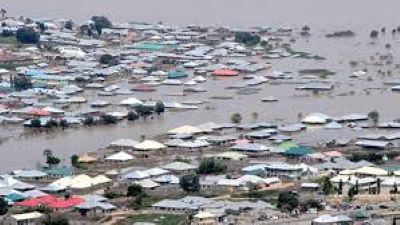The Nigeria Centre for Disease Control and Prevention (NCDC) has warned the public about a rise in diseases like cholera, yellow fever, and dengue fever. The alert comes as many parts of the country are currently experiencing floods.
The warning, titled *“Protecting public health during flood season,”* was signed by NCDC’s Director General, Dr. Jide Idris. It focuses on how the rainy season is increasing the risk of disease outbreaks.
The Nigerian Meteorological Agency (NiMet) also issued a flood warning for July. It said that Sokoto, Lagos, Edo, Benue, and 16 other states are at high risk of flash floods.
NiMet listed the following states as flood-prone: Sokoto, Kaduna, Zamfara, Yobe, Bauchi, Bayelsa, Jigawa, Adamawa, Taraba, Niger, Nasarawa, Benue, Ogun, Ondo, Lagos, Delta, Edo, Cross River, Rivers, and Akwa Ibom.
NCDC explained that flash floods can displace people from their homes, disrupt their daily lives, and increase the spread of diseases—especially those spread through water or by insects.
They said floodwaters often mix with dirt, animal waste, and sewage, which then contaminate rivers, lakes, and drinking water sources. This creates the perfect environment for diseases like cholera to spread. Cholera is caused by a germ called *Vibrio cholerae.
Heavy rainfall also creates pools of stagnant water in places like puddles, tyres, and containers. These places become breeding grounds for mosquitoes, which spread diseases such as malaria, yellow fever, and dengue fever.
According to NCDC, cholera cases are already rising, and yellow fever and dengue fever have also been reported in some states.
The NCDC said it is working with other health organisations and government bodies to respond to these outbreaks quickly and effectively.
“We are seeing more cases of cholera, and now yellow fever and dengue fever are also appearing in some areas,” the agency said. “This is happening at the same time as outbreaks of Mpox and diphtheria.”
The NCDC explained that it is responding by working closely with state governments and health partners. It is improving disease tracking, sending emergency response teams, providing medical supplies, and sharing health information with the public.
Zamfara State alone accounts for 32% of all suspected cholera cases. Other states with high numbers include Bayelsa, Adamawa, Delta, Lagos, and Rivers.
Yellow fever and dengue fever, both spread by mosquitoes, are becoming more serious health concerns in Nigeria.
As of 2025, suspected yellow fever cases have been found in several states. Seven cases were confirmed in Abia, Anambra, Edo, Ekiti, Lagos, and Rivers. A single case is treated as an outbreak, but no deaths have been reported so far.
The NCDC is working to improve disease testing, monitoring, and field investigations in affected areas. It is also partnering with the National Primary Health Care Development Agency to support vaccination efforts.
An outbreak of dengue fever was confirmed in Edo State from June 9 to 13, 2025. Lab tests confirmed the disease, showing that mosquito-borne illnesses are becoming a growing threat.
In Edo, NCDC is working with the state’s Ministry of Health to increase disease tracking, raise public awareness, control mosquito breeding, and support hospitals in treating patients.
The agency advised people to watch out for symptoms like high fever, headache, muscle or joint pain, sore throat, and swollen glands. It stressed the importance of seeing a doctor early.
To avoid getting yellow fever or dengue fever, people should remove standing water where mosquitoes can breed. They should use mosquito repellents, sleep under treated nets, wear long clothes, and get vaccinated against yellow fever.
NCDC also advised communities to improve drainage and sanitation to reduce mosquito breeding. People should not treat themselves at home when sick, because the symptoms may look like malaria but could be something more serious.
Health workers are being urged to be alert for dengue in patients with fever. They should follow safety procedures and report cases to local or state health officials, as dengue must be officially reported by law in Nigeria.


